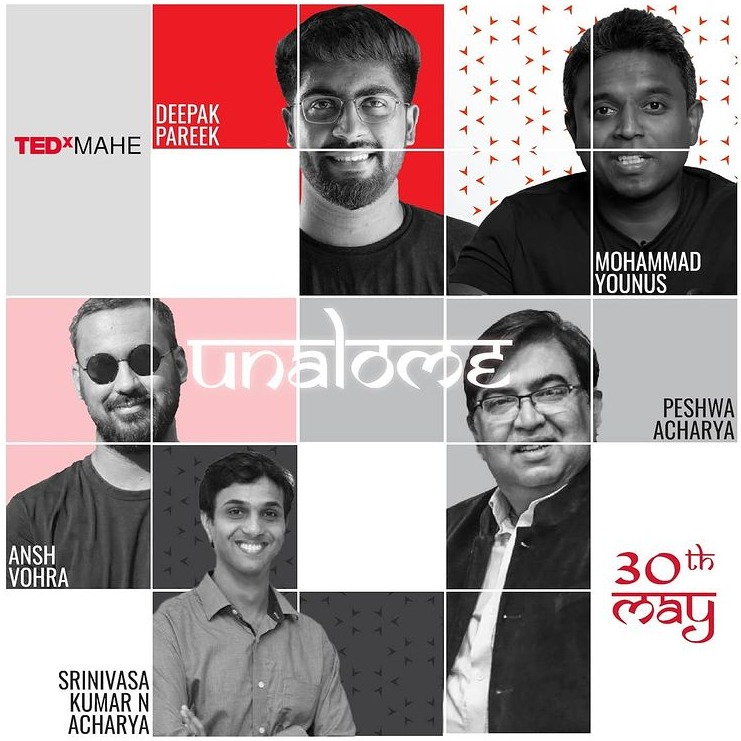
TEDxMAHE 2021 was an event dedicated to the principle of Unalome, which in the Buddhist school of thought signifies a ‘path to enlightenment.’ The event commenced with keeping one thought as a precedent — the secret of change is not to fight the old but to build the new. It was asserted that life becomes a process of being ‘moulded, remoulded, and recast into different shapes’ through one’s experience with adversities, failure, success, etc. Much like the curving lines of Unalome, life is a journey filled with endless curves and trajectories of change. Often, life becomes fulfilled by embracing the change and the journey that meets us. TEDxMAHE 2021 began with a vow to build an experience, in unusual times, that may rival those of the ‘quintessential’ TEDxMAHE events.
Dr. Srinivas Acharya:
An Assistant Professor in MAHE’s Department of Philosophy, Dr. Srinivas Acharya’s talk began with an assertion — life and knowledge are the two most fascinating things that we can have. However, having a life span may not always be enough for one to be alive in the true sense of the word. It becomes important for one to develop an understanding of that which is around us to grow towards a fulfilling life. In a talk that was characteristically personal and captivating, Dr. Srinivas Acharya talked about personal challenges that he faced, especially during the pandemic, which he used to highlight the importance of making decisions that are not only informed but also wise. Dr. Srinivas, who oversees a project called MAHE Mahabharata, also used the plight of King Yudhisthir in his talk to highlight the importance of being fearless, decisive, and responsible to prevent adversities and calamities. It is not only essential that one is brave and victorious in the face of challenges, but also wise and foresighted enough to prevent wasteful conflicts or problems in the first place.
When asked about the relevance of Indian epics and the role of Indian Philosophy in the modern era, Dr. Acharya iterated that there need not be a religious compulsion behind teaching Indian Philosophy — it may be taught with the same vigour and attitude that is shown towards other branches of philosophy. He ended on the note that one can only be provided with the knowledge currently available in the world, but its application and use is one’s own choice. Human beings cannot be changed explicitly, but only through their own effort and choice.
Peshwa Acharya:
Peshwa Acharya is a Chief Sales Marketing Officer at the Ampersand Group. Also a Business Leader, a Startup Mentor, and Angel Investor, Acharya was the second speaker for the evening. His talk began with the expression of Unalome, a journey with curving paths, often signifying the work, challenges, and struggles associated with it and a destination that one works towards. Acharya said that once one gains control of this journey, one can be happy. He asked the listeners to turn one’s work into play, which he believed would render it effortless. If one can blur the lines between one’s work and non-work life, the mundanity of the former vanishes. This may help one find a work-life balance.
Acharya also argued that achievement for him meant impacting those around us. In this way, impacting the entire world would be the ultimate sense of accomplishment, but one may start small, with those in our immediate surroundings.
Acharya felt that the journey signified by Unalome might be seen as a car ride through mountainous terrain, one that can be challenging but also beautiful, and with a rewarding destination. When asked whether one should see either the journey or the destination as being more important, he said that it was the former, for it is more important to focus on the work that we put in, rather than to remain fixated on a goal, to ultimately achieve our objective.
Deepak Pareek
A creator and one of the co-founders of ‘Career Keeda’, Pareek’s talk was engaging due to its frequent cricket analogies and references to former Indian cricket team captain MS Dhoni. He began by thinking of the game of life with its three critical components — the teammates, the coach, and the captain. One cannot play a game of cricket alone, and for this, our teammates become an important asset for us. One is impacted by the people that one comes across in life. Whether they be good or bad for one, all of them contribute to building the person one. A teammate can make or break you, and often, the selfishness of one individual can become a fatality for the team. Secondly, a coach can make or break a cricket team. An individual’s life is often shaped by their mentors. On this note, Pareek pointed out that one may have several mentors in life to enhance our capabilities.
While listening to Pareek’s amusing analogy of life as a cricket game, the audience found themselves questioning the role of friendships in an individual’s life. A question about the virtue of seeing companionships only as a means to an end in one’s life was raised. He approached the question by suggesting the word ‘collabitition’, meaning that one has to carry ‘collaboration’ and ‘competition’ together in a world where there is cutthroat competition. However, he iterated that one cannot celebrate alone when on top, and thus ‘you have to carry your tribe with yourself.’ He left the answer open-ended, hinting that the idea of ‘collabitition’ might open new windows of interpersonal relationships.
Mohammed Younus
Well known for his light-hearted and humorous speeches, and captivating style, Mohammed Younus was the fourth speaker for the evening. His talk was focused on schools, a place where he said one learns most of the things that constitute one’s life. He pointed out that schools still maintain marks as the only yardstick to measure one’s skills. He also pointed out a culture of criticism that often diminishes a child’s appreciation and understanding for their own skills. For this to be prevented, he asked that to hone our skills — we must first learn what our strengths are. He ended by saying that if children pass school knowing their strengths, they can build and hone these later, and thus utilise them better.
Younus also addressed the doubts among people pertaining to gauging one’s potential through the barrier of screens, mics and cameras. He explained that these conditions had been a major setback for older generations for whom physical, interpersonal communication was significant. Taking a well-aware risk of generalisation, he mentioned that for Gen-Z and millennials, the reliability and adaptability of technology were already increased. He reassured the audience that no one can judge a person entirely in a fifteen-minute interview, irrespective of it being conducted online or offline. It is only after a few months of recruitment of a candidate that the company determines the value of the individual. Thus, he ended by implying that what builds relationships is a careful investment of time and energy.
Ansh Vohra
The last speaker for the day, Ansh Vohra, is a documentary filmmaker based in Toronto. His talk began with a captivating narrative that aimed to highlight how, in troubled times, where statistics often become our means to measure a calamity or a crisis, the constant measurement of these crises in numbers and graph sheets can lead to people becoming desensitised to human issues.
It was here that Vohra accentuated the importance of bringing out individual, personal stories, to highlight how behind statistics and numbers are often valued human lives, and that in a crisis or a calamity, the loss of even one, seemingly small individual in comparison to thousands of deaths, is a gigantic loss to humanity. By highlighting and re-sensitizing these human lives, we can reinvigorate efforts to fight adversities once more.
Responding to the importance of inculcating intersectionality in story-telling, Vohra strongly stated that it is essential to acknowledge that experiences do not exist in vacuums. He noted the effects of the privilege of gender, class, sexuality, and political rights on individual experiences. He explained that intersectionality presents an individual as a three-dimensional being instead of a cardboard cut-out. However, from a technological standpoint, one must be aware of the limited number of minutes to display their content. Hence, while intersectionality is an essential backdrop to set a story, it is also a test of one’s creative abilities to weave intersectionality into the narrative craft within the restraints of time and technology.
An Event Like No Other:
The evening ended with a vote of thanks where the speakers interacted and discussed the nature of recent online events. TedxMAHE 2021 was an intriguing mix of insightful talks by admirable individuals, spiced up with singing and dance performances that further added to the colourfulness of the affair. The social spaces helped bring together the audience even in the virtual world.
Written by Lavya Joshi and Maanya Shukla for MTTN
Edited by Shirley Asangi for MTTN
Featured Image and Images by TEDxMAHE
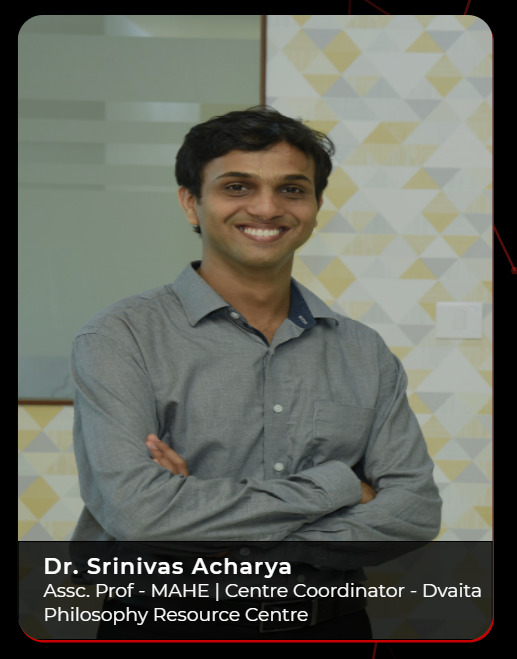
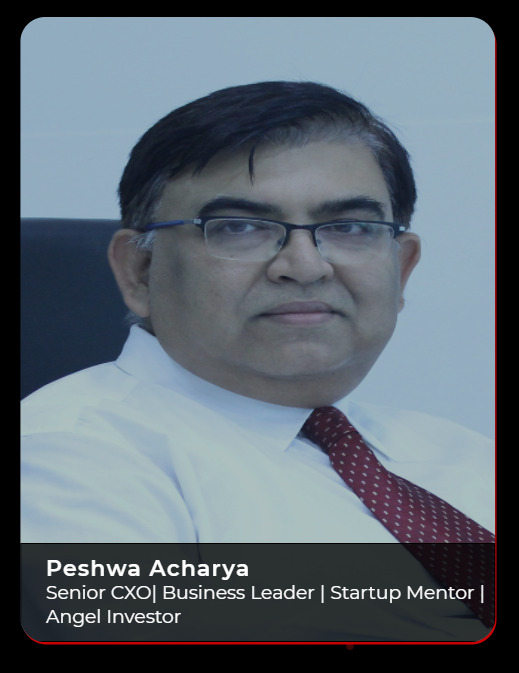
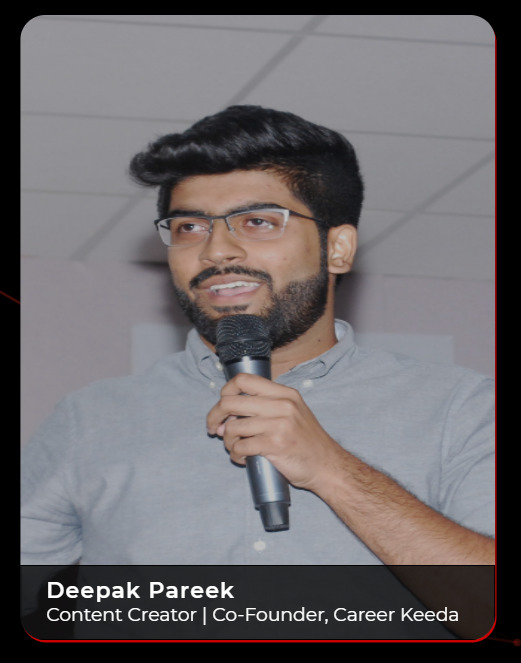
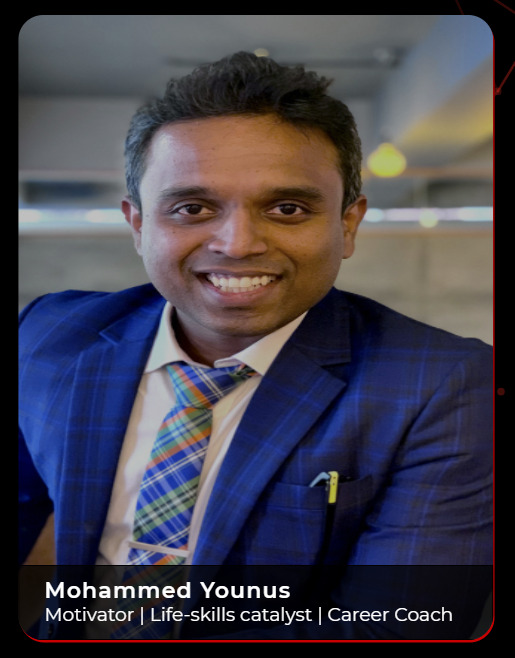
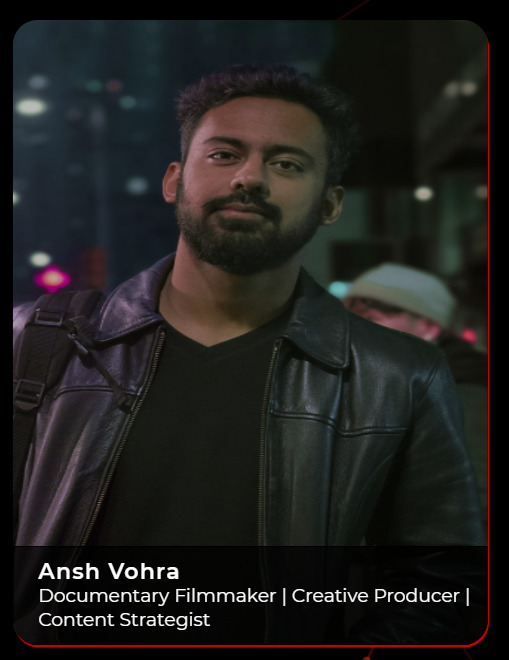
Leave a Reply
You must be logged in to post a comment.